A definitive list of things wrong with Fullmetal Alchemist: Brotherhood: the second half doesn't focus on the Elric brothers enough, the opening episodes move too quickly for newcomers, some of the episode cliffhangers feel forced, the cities are unimaginatively named. With those out of the way, all that's left to say is that this is probably one of the finest, most unspeakably brilliant series to have ever been produced. Flaws are present but they are insignificant in comparison to the wealth of overriding positives - every element is sublimely constructed whether that's the story, characters or animation and for once a series has the budget and creative clout to thoroughly trounce all but the most high-profile productions. It may not be perfect, but it is the closest that any series or movie has yet reached and it transcends its media to achieve something extraordinarily special.
Edward and Alphonse Elric are alchemists, gifted from a young age they are the youngest to have ever joined the state military. Their past however is far from blessed, the death of their mother and their subsequent handling was not without its consequences, for one Ed lost both an arm and a leg, now replaced with prosthetic "auto-mail". Al on the other hand lost his entire body, he is now soul-bound to a suit of armour - able to move and talk but not eat, sleep or feel the touch of another. Together they are on a quest to regain their bodies, but dark forces are stirring and their foes - both human and alchemy borne - are many. Their friends are equally numerous though, and with the help of people like Mustang, the flame alchemist, their old teacher Izumi and their childhood friend Winry, they could well triumph over such world-encompassing adversity.
The existence of the previous, well-regarded Fullmetal Alchemist series poses the burning question of why bother to remake it? The first was wildly popular and though held significant flaws, was enjoyable both as a series and with the concluding movie. That the latest series follows the manga is not an instant, resounding endorsement but the quality of the narrative and characters proves without a doubt this is a juggernaut compared to the previous series' ant-like stature. Beyond the opening few episodes there are few links between the two and comparisons become meaningless: this series is better in absolutely every regard. Whereas some tertiary characters were spun out into protagonists and antagonists, here they are killed-off or rightly marginalised to make room for the ones which prove the most engaging.
This quality is most evident in the villains, starting with the iconic Scar and finishing with a creature that attains the power of God. Scar is the most traditional of antagonists in that he is directly opposed to the protagonists - Ed and Al - and his raison d'etre is for them to perish, as the series progresses this ebbs until he is no longer an aggressor but not quite an ally. The glory of his development is that there is never a defined turning point when he switches sides, kowtowing to the good guy's whims; his purpose never changes but his methods evolve as both he and the audience learns more about his reasons. Though he is constantly on the edge of breaking, bulging with a primal anger, his search for revenge and then redemption sparks some brilliant drama beyond the superb alchemical battles, most poignantly with Winry who herself grows with the series.
She however is just one of a cornucopia of strong female characters that make the series so exhilarating and different to other anime. The risk that Winry would become the antithesis to the series' genre-defiant nature and sink to a fan-service pin-up is mostly avoided barring a couple of sigh eliciting moments - she may be the most whimsical of the leading females but she is far from two dimensional. Being in the shadow of Ed and Al as well as the death of her parents are key to a lot of her development and though she is quite literally left at home in the latter quarter of the series, she provides as much emotion as she does levity. Generalising any of the other stellar female roles would be lesson in futility and to have even one of this calibre in a series is rare, but to have several is extraordinary.
First is Lan Fan, the gung-ho bodyguard to the eastern king Lin who even in her introduction is demonstrated to be immensely capable and headstrong; after her tussle with Bradley though she shows a pragmatism and frailty that is remarkably endearing. It is a shame that she has a tendency to disappear for long spells, however her scenes are always rife with sentiment. The mid-series introduction of Olivier Armstrong however is magnificent; in charge of the far northern Briggs base, she is brutally practical and inspires a fierce and unyielding loyalty in her subordinates. Though charmingly referred to as an "Ice Queen" by her introductory episode's title, she is hot-blooded, hard-nosed and instrumental to the events of the finale.
Of all the characters though, both male and female, it is Riza Hawkeye who stands out amongst them. A physically and emotionally strong woman, her status as a sharpshooter and non-alchemist would be enough to secure her as one of the most interesting, however it's her past with Roy Mustang that is the most heartbreaking. Her devotion to him forged through trust and mutual understanding, it's telling that when she is transferred under Bradley that she is relegated to making tea and following him around. Her fall from a confident and assertive woman in a commanding position to such menial chores is more degrading than anything she is subjected to later on.
Mustang's position as a protagonist comes into its own upon the death of his closest friend, something which, like all deaths in the series, has meaning and stays with him, continually referenced until the series climax; but again it's his gutsy, utilitarian nature that makes him so brilliant. On more than one occasion his fire alchemy is the subject of some stunning scenes that mark emotional and animation high points, but the side of his character most explored is the divide between his goals and his actions. Claiming he will do anything to ascend to the rank of Führer, more than once his morality and motives are brought into question, living by the maxim of "the ends justify the means" it is up to Hawkeye to temper him as best she can, quelling the concealed fury when it boils over.
It is that emotion which many of the more accessible enemies, the Homunculi, lack and one of the series strongest messages is on the nature of humanity and their difference to that of monsters. This ethos is explored throughout from the very first encounter with the Sewing-life alchemist whose experiment is just as achingly heartbreaking as it was in the first series, through to the chimera who can mutate their bodies at will. Every homunculus demonstrate different shades of this: Envy - a chameleon amongst humans but a torrid and grotesque monster beneath; Greed - longing for comrades but cowering within his shell or Sloth - constantly working and begging for a quiet life. It is Wrath though that demonstrates how vividly an antagonist can be drawn.
More than any other Wrath is ferociously terrifying by being the most human - replete with passion, goals, family and child - but also the most heartless, ceaselessly carving a bloody path through anyone who opposes him. His demise is littered with more fake deaths than is warranted, but his tenacity cannot be denied. Fundamentally that is how all of the series' antagonists are bested, their hubris ultimately dooms them but it is humans and their power that defeats them. All of them search for humanity in their own way, even ones once thought devoid such as Kimbley, and ultimately have to submit to its power and be overwhelmed, regardless of the supernatural strength they possess. The homunculi after all can only emulate humans, never surpass them.
Humanity is something that both of the Elrics deal with throughout the series and it feeds back into the series' subtitle: brotherhood. Al especially has to come to terms with the concept that he could have been crafted, bound to the armour with false memories rather than affixed as a soul. Likewise, although he ostensibly has an immortal body that never needs to sleep or eat, he is entirely dependent upon Ed for repairs and on more than one occasion he is wrecked almost to the point of ruination. Many elements about the soul binding are left untold lest it become steeped in science rather than theology, some concern over water wouldn't have gone amiss though. By far the greatest triumph of the pair though is that their companionship never feels forced and there is a genuine chemistry between them that is all the more apparent when they are divided later in the series.
Theirs is a path of punishment - of themselves and of the villains, redemption - coming to terms with what it means to regain their lost bodies, and ultimately family. When the nature of the philosopher's stones is exposed, the promise they make seems almost throwaway but it permeates how they live, and even in the final moments when all hope seems to have evaporated, there is a trust and commitment that succinctly defines their characters. The series is many things: political, supernatural, romantic and war, but it is primarily their journey, a coruscating coming of age tale; there is a palpable sense of progression as the final episode ends not just in Ed's increased height or Winry's longer hair, but in the weight of their achievement.
The ease and comfort the series exhibits in so many different areas is often breathtaking, deftly sliding from gob-smacking battles that are slick and kinetic, making it feel as if one's eyes were orgasming, through to quiet reposes where volumes are said with Winry quietly wiping blood from Al's armour. That juxtaposition is evident throughout, especially so at the beginning when storming through familiar territory for series veterans, oscillating between goofy, super-deformed humour and serious dialogue. So too is it present in the characters, Olivier and Alex's combative relationship opposes Ed and Al's, similarly the nuclear family enjoyed by Bradley contrasts with Ed and Al's status as orphans, all the more poignant when their wayward father Hoenheim is considered.
Fullmetal Alchemist: Brotherhood encapsulates the full gamut of characters and emotions, it tells an original story blisteringly well. It is about great lions of men, graceful and strong women, families and friends, enemies and allies. It has everything that a good story should have and that includes a conclusive and satisfying ending, a meaty and revelatory middle and a balls-to-the-wall beginning. Whereas the first series could best be described as for younger boys, this one is anything but: dark, bloody and adult it is challenging and subversive, never slipping into cliché and always, without fail, entertaining. What faults can be identified risk becoming petty hair-splitting when such an enormous swell of sheer excellence is elsewhere. There is no other way of describing the series as anything other than an unmitigated masterpiece of creativity and execution and it stands as a classic of epic proportions.
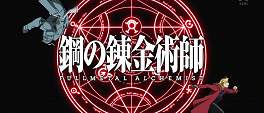
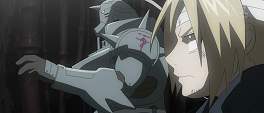
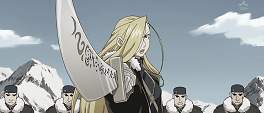
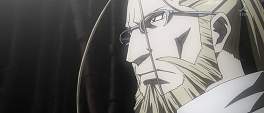
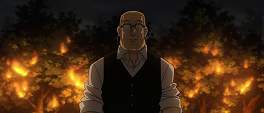
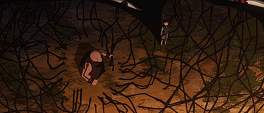
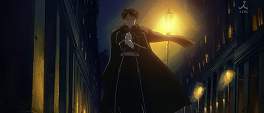
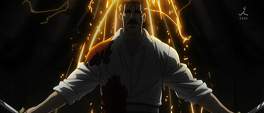
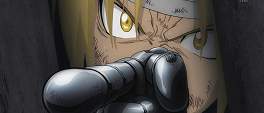
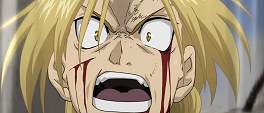
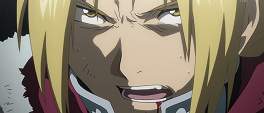
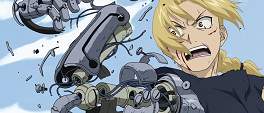
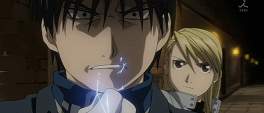
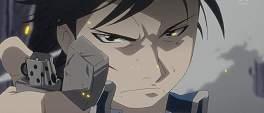
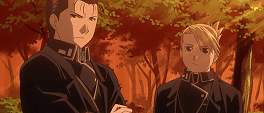
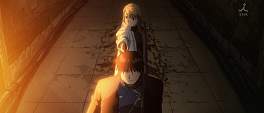
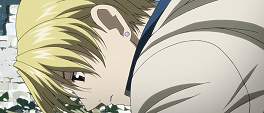
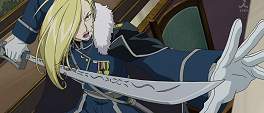
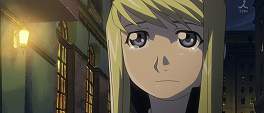
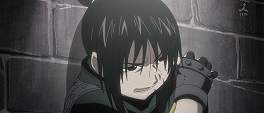
Whew, hyperbole much?
I think this is pretty unfair to the original. In some respects, the first anime did improve on the manga-anime version. For example, I found the homunculi to be much more interesting. There, human transmutation had real consequences, could and did come back to haunt them, and the encounters between homunculi and alchemists were far more affecting.
(And this extends to their origins and terminations. Look at Wrath - reduced to the product of injection. Is that really a better origin? And Wrath's death by constant fighting is the sort of thing we mock shonen anime for; his death in the first was much better. Or look at Greed; the second Greed's death at the climax was fine, but his first death was just pathetic.)